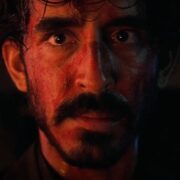BOYHOOD: An Ambitious, Intimate Epic
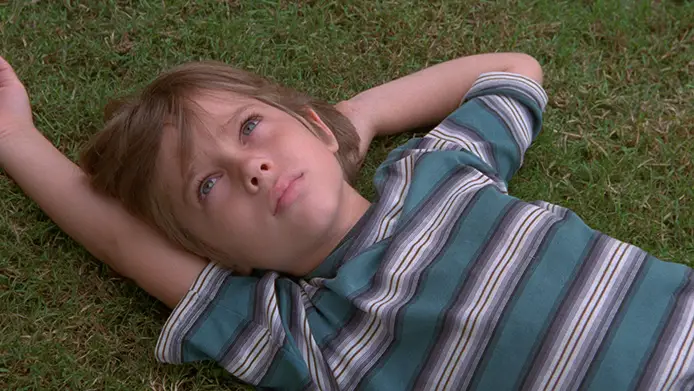
David is a film aficionado from Colchester, Connecticut. He enjoys…
“Our life is frittered away by detail…simplify, simplify.”
The average life of the white collar worker is, from sunrise to sunset, an endless escapade of chores, professional obligations, and miscellaneous daily tasks, from the big decisions we have to make (college, job, spouse, etc.), to the annoying, tiny details that often blind us to what’s really important. Because, if you really think about it, how lucky are we?
We are here, and we’re alive in this world, and even if we have a small allotted time to actually enjoy ourselves, we should at least be appreciative of such a rare and precious gift. Henry David Thoreau, who said the quote above, learned that through his adventures in the novel “Walden,” but most of us (myself included) do not stop to appreciate the simple things.
Unfortunately, we do not all have the luxury of being able to simply go off into the woods and live in a cabin for a few months. We have to support ourselves and our families; therefore we need money, and therefore we need to work. And while we sit there in our tiny cubicles, with bright humming florescent lights above us, it’s hard to think that there is anything in life that is worth all this. We are caught up in the details.
But, through Richard Linklater‘s eyes, you may find yourself thinking differently. Everybody grows up, everybody ages and changes and maybe has a family of their own one day. But what makes it beautiful is those in-between moments; a warm conversation with a loved one, the peacefulness of a summer afternoon, that brief interlude before sleep when you reflect on the adventures of your day, where nothing can possibly disturb the moment.
It is with this concept that Boyhood succeeds. Telling the story of a boy from age 6 to 18, and filmed over that same time, it is a beautiful, poetic journey of life, with all of its ups, its downs, and, of course, everything in-between.
The journey of life
In the opening shot of Boyhood, we see a young boy laying out on the grass and staring up at the clouds, calm and content, his face and features motionless. He is undisturbed by anything else, blind to the world around him. In just this simple, seconds-long shot, the tone of Boyhood is immediately set. This will not be a grandiose adventure that will change your life. It is a simple story, simply told.
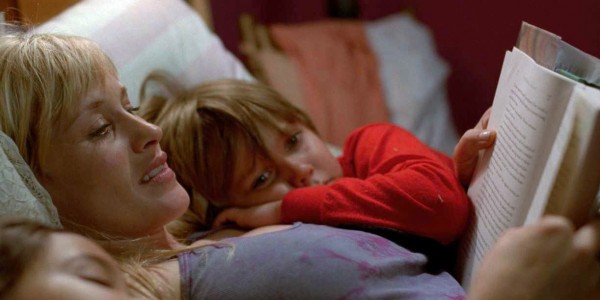
The boy is Mason Jr. (Ellar Coltrane), a 6-year-old growing up in Texas along with his older sister Samantha (Lorelei Linklater), their mother Olivia (Patricia Arquette), and (somewhere) their estranged father Mason Sr. (Ethan Hawke). Boyhood takes place over a course of 12 years, and, remarkably, it was filmed during that time as well, from 2001 – 2013, containing the same cast the entire time. So, when put together, you get the 12-year story of a family, told in real time. You watch Mason Jr. grow from a young boy to a teenager, and you watch his family grow up around him.
As a young kid, Mason’s concerns are about the same as any other – he fights with his older sister, loves to play video games, and wonders why his father is not around. As he gets older, he not only noticeably grows and matures, but his concerns also change with him – he now reads Harry Potter and even goes to a midnight release of the 6th book; he is embarrassed by a new haircut, but immediately changes his mind when he learns that a cute girl across the room likes it; he learns photography, and discovers that he has a real knack for it; he starts to drink and smoke pot with his friends, and gets an earring because he’s trying to be ‘cool.’ By the end of the film, he’s clearly no longer that cute little kid. As happens to all of us, he has grown up.
Filmed over 12 years – a gimmick?
Hearing that, you might assume that the whole idea is just a gimmick, and that Richard Linklater made this film just so that you are undeniably impressed with his skills and devotion to a single project over such a long period of time. In some ways, this may be true. But in many other ways, it is definitely not.
In Boyhood, there is no issue as there would be in a similar type of story, where the movie would take place over the course of many years yet is filmed over only a few. For this, the production team would be forced to hire different actors to play the same character, with the hopes that they all look enough alike that the audience will believe it is the same person. In Boyhood, though, we know. Mason in the beginning is the same as he is in the end. There is just something undeniably magical about that, almost as if you are witnessing a life in motion. Gimmick, maybe. But also astonishingly beautiful.
The ups
By far the most enjoyable moments of Boyhood come between Mason and his father, played by Ethan Hawke with an infectious charisma. In one of the first scenes, Mason and Samantha go bowling with him, where they finally get to question where he has been for most of their lives. Mason, Sr., despite his obvious affections, is clearly not mature enough to be raising kids. But, years later, when they go out to a baseball game, he is just a little bit more stable and is starting to date again, and even years after that, he finally seems like a fit father.
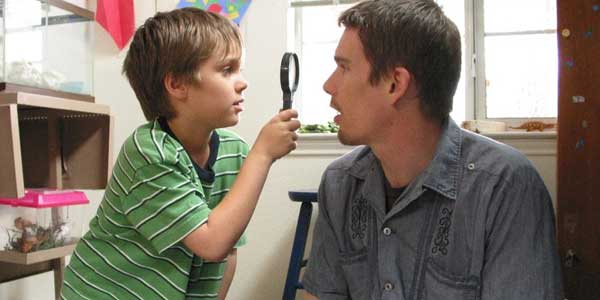
His conversations with Mason, from when he is young to older, range from a discussion about the existence of magic, to when he is a teenager and discussing a sequel to Star Wars, to when he is finally older and is heartbroken after a recent breakup. All along the way, he is there for Mason, and proves to be the one solid rock and influence in his life. More than anything, Boyhood is about the subtle moments between people that change us, and those tiny encouragements that could decide the outcome of our future.
The downs
But, like life, there are always two sides. As much as Mason Sr. has grown and matured into the person he wishes he was at the start, Patricia Arquette‘s Olivia has gone backwards. As a single mother raising two kids, she somehow still had the time to go back to school, eventually earning her degree and getting a well-paid job in teaching. She attempts to settle down and have a normal life, but a seemingly endless series of drunken, idiotic husbands are determined to make her lose all hope. After supposedly getting everything she ever wanted, she is left disheartened and alone, with her kids grown up and out of the nest.

Olivia seems to be a symbolic representation of all hard-working single mothers, who do everything to make their kids happy, yet end up feeling desolate all the same. It is heartbreakingly sad, and the role is played to intense perfection by Arquette, who rightfully won an Oscar for the film. In life, not everyone wins out in the end, and Boyhood, although also brimming with optimism, is not without its bleak moments.
Physical and mental growth
At its heart, though, Boyhood is the story of Mason. While we clearly witness his physical change, especially towards the beginning when he seems to age by the second, we also see just the kind of person that he becomes when he is older. Mason is, in some ways, not your typical teenage kid, often having these strange ideas about what should and should not be acceptable in today’s society. He even has entire conversations with people about how he refuses to be what people would call “normal.”
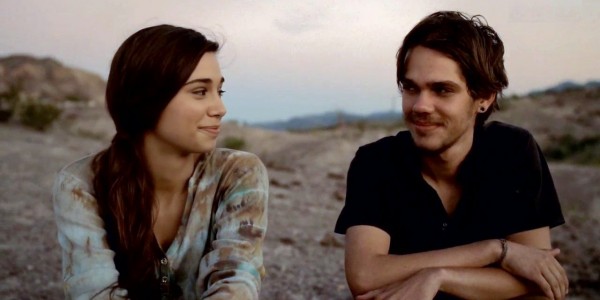
Although admirably played by Ellar Coltrane, there is also reason to believe that the character is based on Linklater himself, who may have felt very similar to Mason while he was growing up. Like Mason, Linklater also found consolation behind a camera, where he could finally express himself without people thinking he was strange. And the influence of people in his life finally allowed him to focus on his goals of being successful. By the end, when Mason discusses “always being in the moment,” it is a reference to his earlier statements in which he asked about “the point of it all.” He has finally grown in spirit, and it ends the film on a sincerely hopeful juncture.
Conclusion
Throughout my many ramblings, you may have noticed that I never once mentioned the fact that Boyhood did not win Best Picture at the Oscars this year. The reason for that is because I really did not want this review to sound like a bitter agenda-pusher, and I wanted to simply judge the movie on its own merits.
I’ll say just one thing, though. Boyhood was, at least in my opinion, the most brilliant and admirable film of last year, and I sincerely hope that one day, the Academy will finally realize their mistake in not awarding it the top prize. Even if it takes them another 12 years.
What did you think of Boyhood? Do you agree it deserved the Oscar for Best Picture?
(top image source: IFC Films)
Does content like this matter to you?
Become a Member and support film journalism. Unlock access to all of Film Inquiry`s great articles. Join a community of like-minded readers who are passionate about cinema - get access to our private members Network, give back to independent filmmakers, and more.
David is a film aficionado from Colchester, Connecticut. He enjoys writing, reading, analyzing, and of course, watching movies. His favorite genres are westerns, crime dramas, horror, and sci-fis. He also enjoys binge-watching TV shows on Netflix.













